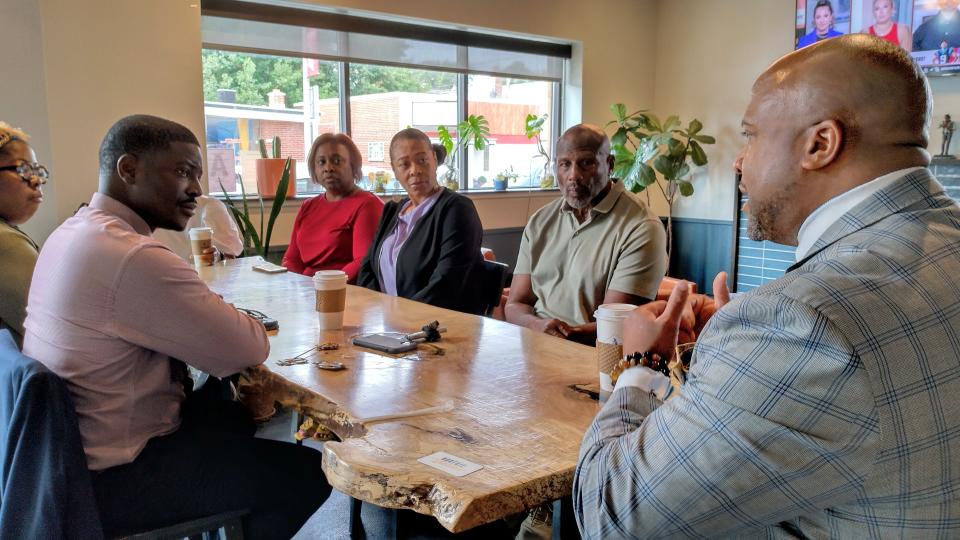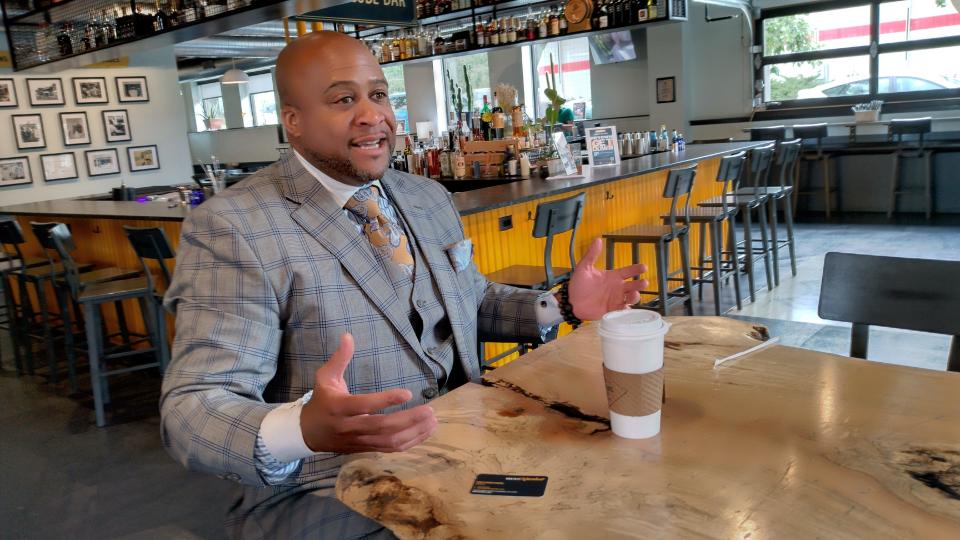Crowley sees Mitchell Airport as opportunity to grow county's Black businesses

Milwaukee Mitchell International Airport is one of the county’s economic engines — one that Milwaukee County Executive David Crowley wants to leverage to grow Black businesses.
“From a county perspective, the biggest asset we own is the airport,” Crowley said.
He wants to take a page from former Atlanta Mayor Maynard Jackson, who turned Hartsfield–Jackson Atlanta International Airport not only into the world’s busiest but an economic opportunity for minority-owned firms.
Crowley met with several Black business owners and advocates as part of his Coffee with Crowley event series Tuesday at the North Avenue Market, 5900 W. North Ave. He's been having these get-togethers to learn about barriers facing business groups throughout the county — and how the county can be a better resource for entrepreneurs.
Tuesday’s gathering was in recognition of August being Black Business Month, but the discussion quickly turned to contracting opportunities for Black-owned firms.
When building the airport, Crowley noted Jackson insisted the airport had to have a certain amount of minority firms.
“That’s actually how they built wealth throughout the Atlanta area,” Crowley said. “We need to be looking at those same types of opportunities.”
Investing in Mitchell Airport with more direct flights can lead to more entrepreneurial opportunities and keeping those dollars in the county, Crowley said.
The airport’s potential goes beyond the concession stands, said Sherri Jordan, deputy director at Milwaukee County.
A small business owner might not be able to own a Hertz or Enterprise rental care franchise but, if certified as a minority business enterprise or a woman business enterprise, they can get contracts to wash the cars or provide the soap to wash the cars.
“There are greater opportunities at the airport for certified firms to capitalize on things going on at the airport,” Jordan said.
It’s also a way to scale a business because the owner can become certified at Chicago’s O’Hare or other airports across the country, she said.
Here are three other takeaways from the event:
Rethinking how the county's procurement process works

For businessman Ugo Nwagbaraocha, supporting Black businesses begins with making the procurement process more malleable.
One way to do that, said Nwagbaraocha — who's president of the Wisconsin chapter of the National Association of Minority Contractors — is to make bidding on contracts more digestible. Some contracts, he said, contain up to 40 items that a small business has to be knowledgeable of and competitive in.
“As a small business owner, you are not going to be competitive in all those markets,” said Nwagbaraocha, also president of Diamond Discs International, a wholesale distributor of construction tools.
Bigger contracts, he said, should be broken down into smaller ones — making it easier for small businesses to compete in niche markets they're good in. The benefit, Nwagbaraocha said, increases the number of minority applicants, but also could save the city, county and even Milwaukee Public Schools money.
“But you have to be able to think about that,” Nwagbaraocha told Crowley. “If we are really being intentional about opportunities for diverse businesses to do business, then why is this contract structured the way it is?”
Crowley agreed. Some county contracts are so large that only large corporations can go after them, he said. Even the insurance requirement for a contract can be a barrier for small businesses. And being certified as a minority- or women-owned business doesn’t guarantee a contract.
“It only says you’re a Black-owned business, and we should probably look at your business because you haven’t been getting these opportunities,” Crowley said.
The county, he noted, must be creative and innovative in structuring contracts. Breaking them up could provide more opportunities for more small women-owned businesses to “build their own capacity (and) to help grow our economy locally,” Crowley said.
“We are looking internally to think of, 'How do we help get over those things in the future?"” he said.

Local chambers of commerce can help Black businesses
There are benefits to joining a local chamber of commerce, said Nikki Purvis, president and CEO of the African American Chamber of Commerce. She said corporations and companies use the chamber to find minority businesses to meet their diversity and procurement needs.
Just recently, a large health care system contacted the chamber, seeking a business to create natural hair care kits for its patients. A business the chamber recommended was awarded the contract. The chamber, she said, not only has connections with corporations but with city, county and state procurement departments.
“Those are the types of things that we can help support with,” Purvis said.
Potential business owners have to evaluate themselves first
For Quan Madison, the key to a successful business takes more than a business plan but a self-evaluation. Madison has been a business owner for 25 years and is CEO of Excelle Employment Solutions, a workforce development firm.
“A lot of people don’t understand, to start a business, you have to first look at who you are a person,” Madison said.
Potential entrepreneurs, she said, need to know if they're an introvert or extrovert, whether they know about money management and what their strengths or weaknesses are. Then they should find a business coach or mentor to help guide them, she said.
Passion and good ideas are one thing, but if a person doesn’t understand the administrative side of things, that business will fail, she said.
“There is a whole other side of (a business) that has nothing to do with what you do on a day-to-day basis,” Madison said.
This article originally appeared on Milwaukee Journal Sentinel: Crowley sees airport as way to grow Milwaukee County Black businesses
